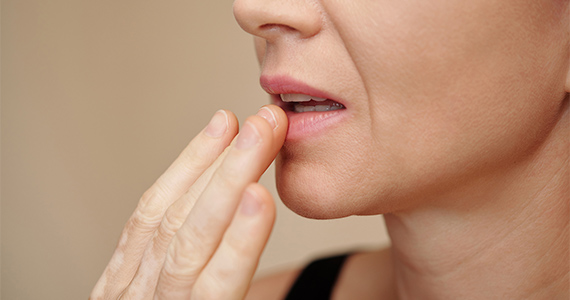What Is Oral Psoriasis?
Psoriasis, a relatively common skin condition, can have an effect on oral health.

Psoriasis is a pretty common auto-immune skin disorder that causes skin cells in certain areas of the body to rapidly multiply. Symptoms often include bumpy red patches of skin covered with white scales on the elbows, knees, lower back or scalp. Some people may have these patches on other areas of their body. The condition is not contagious. It generally appears in early adulthood and may be hereditary.
Oral psoriasis is rare. It only develops inside the mouth of those who already have psoriasis. It is linked to the uncommon forms of pustular or erythrodermic psoriasis. Plaque psoriasis, the most common type of psoriasis, does not cause oral psoriasis.
Symptoms of oral psoriasis can appear anywhere in the mouth. However, they most commonly appear on the inside of the cheeks as raised, scaly areas. Symptoms may also include:
- Sores in the mouth
- Red patches of skin with white or yellow edges
- Pustules (blisters filled with pus)
- Peeling gums
- Pain/burning lips
- Changes in taste
Diagnosing Oral Psoriasis
A visual exam is usually sufficient to diagnose oral psoriasis. The diagnosis is generally made by a doctor who is already seeing the person for their psoriasis condition.
If you experience the symptoms listed above and have not been diagnosed by your doctor, your dentist may need to review your medical history and/or complete some tests in order to determine the cause. A biopsy may be necessary to rule out other conditions.
Treating Oral Psoriasis
Many times, oral psoriasis heals on its own and symptoms go away extremely fast. However, a doctor or dentist may recommend treatment during a flare-up. Treatment may include just one of the following or a combination of them:
- An antiseptic rinse
- Topical medication(s)
- Prescription strength vitamin A
- Other prescription medications
There is much that remains unknown about oral psoriasis and how to treat it. This is likely because dermatologists who treat psoriasis do not check inside the mouth. If you have psoriasis on your skin and are noticing symptoms in your mouth, tell your doctor or dentist. This can help you get treatment for oral symptoms in a timely manner if they do not go away on their own.
Note: The information in this article is not meant to replace the advice of your dentist or another licensed healthcare professional. Talk to your dentist for any specific dental advice.






